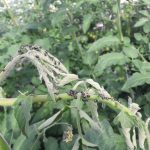Yes, aspirin can help tomato plants. In fact, it is beneficial for tomato plants as it helps prevent fungal diseases and improves their overall health and productivity.
Aspirin contains salicylic acid, which acts as a plant hormone and triggers the plant’s defense mechanism against pathogens. By using aspirin as a foliar spray, tomato plants are less likely to be affected by fungal infections, such as early blight or powdery mildew.
Additionally, aspirin can enhance the plant’s resistance to environmental stresses, such as extreme temperatures or drought. It is important to dilute the aspirin properly and follow the recommended application guidelines to ensure the best results. Overall, aspirin is a cost-effective and natural way to promote the growth and vigor of tomato plants.
The Science Behind Aspirin And Tomato Plant Growth
Aspirin’s impact on tomato plants has gained attention due to its potential growth benefits. Scientists are exploring the science behind it and whether aspirin truly aids in the development of tomato plants.
Introduction To The Relationship Between Aspirin And Plant Growth
Have you ever wondered if using aspirin in your garden can really help your tomato plants grow better? The idea of using aspirin as a plant growth enhancer has been around for quite some time. But what does science have to say about it? In this article, we will explore the science behind the relationship between aspirin and tomato plant growth.
Aspirin, also known as acetylsalicylic acid, is a common medication for humans, used as a pain reliever and to reduce inflammation. But it turns out that aspirin may also have potential benefits for plants, including tomatoes. So how does aspirin affect tomato plant growth?
1. Boosting Immunity: One of the key ways aspirin is thought to help tomato plants is by boosting their immune systems. Plants, like humans, can be susceptible to diseases and infections. Aspirin has been found to activate specific proteins in plants that help them fight off pathogens, potentially enhancing their immune response.
2. Increasing Nutrient Uptake: Aspirin has been shown to increase the absorption of nutrients in plants. This means that tomato plants treated with aspirin may be able to take up more essential nutrients, such as nitrogen and phosphorus, from the soil. This can contribute to healthier growth and better yields.
3. Stimulating Growth Hormones: Aspirin has been found to stimulate the production of growth hormones in plants. These hormones, such as auxins, are responsible for promoting cell elongation and overall plant growth. By promoting the production of these hormones, aspirin may help tomato plants grow bigger and stronger.
It is important to note that while there is some evidence supporting the benefits of aspirin for tomato plant growth, the results can vary depending on various factors, such as the specific tomato variety, growing conditions, and dosage of aspirin used. Additionally, it is always recommended to conduct further research and consult with experts before implementing any new techniques in your gardening practices.
In conclusion, the science behind aspirin and tomato plant growth suggests that aspirin may have positive effects on boosting plant immunity, increasing nutrient uptake, and stimulating growth hormones. However, it is crucial to carefully consider the specific circumstances of your garden before deciding to use aspirin on your tomato plants.

Credit: www.amazon.com
How Does Aspirin Affect Tomato Plant Growth?
Aspirin, a commonly used medication for human health, has long been rumored to have positive effects on plant growth as well. But how exactly does aspirin affect tomato plant growth? In this article, we will explore the fascinating relationship between aspirin and tomato plants, focusing on the role of salicylic acid in plant growth and development, as well as the effect of aspirin on salicylic acid production in tomato plants.
The Role Of Salicylic Acid In Plant Growth And Development
Salicylic acid is a naturally occurring plant hormone that plays a crucial role in plant growth and development. It is involved in various physiological processes, including seed germination, root development, flowering, and fruit ripening. Additionally, salicylic acid acts as a defense mechanism against biotic and abiotic stresses.
In response to stressors such as pathogens or environmental changes, plants produce and accumulate salicylic acid. This increase in salicylic acid triggers a series of defense responses, enhancing the plant’s resistance to diseases and pests. It also promotes the activation of genes responsible for plant growth and development.
The Effect Of Aspirin On Salicylic Acid Production In Tomato Plants
Aspirin, with its active ingredient acetylsalicylic acid, structurally resembles salicylic acid. Due to this similarity, it has been proposed that aspirin may mimic the effects of salicylic acid when applied to plants. Research has shown that aspirin can indeed influence salicylic acid production in tomato plants.
A study conducted by researchers found that tomato plants treated with aspirin showed an increase in the production of endogenous salicylic acid. This increase in salicylic acid levels resulted in enhanced disease resistance and improved plant growth.
| Benefits of Aspirin on Tomato Plants: |
|---|
| 1. Enhanced disease resistance |
| 2. Improved tolerance to abiotic stresses |
| 3. Increased root and shoot growth |
| 4. Higher fruit yield and quality |
These findings suggest that aspirin positively influences tomato plant growth by inducing salicylic acid production. However, it is important to note that the application of aspirin should be done with caution and in moderation. Excessive or frequent use of aspirin may have negative effects on tomato plants.
To summarize, aspirin can affect tomato plant growth by promoting the production of salicylic acid, which in turn enhances disease resistance and stimulates various plant developmental processes. Understanding the relationship between aspirin and tomato plants can offer gardeners and farmers new strategies for improving crop health and productivity.
Benefits Of Aspirin For Tomato Plant Growth
When it comes to ensuring the robust growth and overall health of your tomato plants, the use of aspirin might not be the first thing that comes to mind. However, research suggests that aspirin indeed has numerous benefits for tomato plants. In this blog post, we will explore these benefits in detail and understand why aspirin can be a valuable tool for gardeners and tomato enthusiasts.
Enhanced Resistance To Diseases And Pests
One of the primary benefits of aspirin for tomato plant growth is its ability to enhance resistance against diseases and pests. Aspirin contains a compound called salicylic acid, which is known for its powerful anti-inflammatory and antimicrobial properties.
The application of aspirin to tomato plants can activate the plant’s natural defense mechanisms, making it more resilient against various diseases such as early blight, late blight, and bacterial wilt. Additionally, aspirin can also deter common tomato pests like aphids, spider mites, and whiteflies due to its repellent properties.
To harness these benefits, prepare a solution of crushed aspirin tablets dissolved in water and spray it onto the tomato plants regularly. This method can help boost the plant’s immune system and protect it from potential threats.
Increased Tolerance To Unfavorable Environmental Conditions
Another advantage of using aspirin for tomato plants is its ability to increase tolerance to unfavorable environmental conditions.
Tomato plants are susceptible to various stress factors such as extreme temperatures, drought, and excessive moisture. These conditions can hinder the plant’s growth and result in reduced fruit quality and yield. However, studies have shown that aspirin-treated tomato plants exhibit improved tolerance to such stress factors.
The salicylic acid in aspirin helps the plant manage stress by regulating its hormone levels and activating protective enzymes. This allows the plant to better cope with adverse conditions and maintain healthier growth even under challenging circumstances.
To make use of this benefit, apply the aspirin solution to the tomato plants before stressful periods, such as hot summer days or prolonged dry spells. This proactive approach can help your tomato plants endure the harsh conditions and thrive despite unfavorable environmental circumstances.
In conclusion, aspirin can offer multiple benefits for tomato plant growth, including enhanced resistance to diseases and pests, as well as increased tolerance to unfavorable environmental conditions. By incorporating aspirin into your tomato plant care routine, you can promote healthier plants, higher yields, and more abundant and flavorful tomatoes.
The Impact Of Aspirin On Tomato Plant Yield And Quality
Aspirin, a commonly found household medication, is known to have various therapeutic effects on human health. However, recent studies have also discovered its potential benefits for tomato plants. When applied in a diluted solution, aspirin has shown promising effects on enhancing tomato plant yield and improving the overall quality of the fruits produced.
Increased Fruit Production And Size
One of the key benefits of using aspirin on tomato plants is the significant increase in fruit production and size. The application of a low concentration aspirin solution as a foliar spray has been found to stimulate the growth and development of tomato plants. This is mainly due to the presence of salicylic acid in aspirin, which acts as a plant hormone and triggers various physiological processes. As a result, tomato plants treated with aspirin exhibit higher fruit set, leading to a larger number of tomatoes per plant.
Moreover, not only does aspirin enhance the quantity of tomatoes, but it also promotes their size. The salicylic acid in aspirin promotes cell division and elongation, resulting in larger and more robust fruits. This can be particularly advantageous for tomato growers who aim to maximize their yield and harvest.
Improved Nutritional Content Of Tomato Fruits
Aside from increasing fruit production and size, aspirin also has a positive impact on the nutritional content of tomato fruits. The salicylic acid present in aspirin has been shown to enhance the accumulation of essential nutrients such as vitamin C, lycopene, and antioxidants in tomatoes.
These nutrients not only contribute to the overall health benefits of consuming tomatoes but also enhance their flavor and taste. Aspirin-treated tomatoes tend to have a richer, more vibrant color, indicating a higher concentration of beneficial pigments like lycopene. Additionally, the increased levels of antioxidants in aspirin-treated tomatoes help boost their nutritional value and contribute to overall plant health.
In conclusion, incorporating aspirin into the care routine of tomato plants can have a significant impact on their yield and quality. By promoting increased fruit production and size, as well as enhancing the nutritional content of the fruits, aspirin serves as an effective tool for tomato growers looking to optimize their crop. Therefore, if you’re seeking to enhance the productivity and nutritional value of your tomato plants, integrating aspirin into your gardening practices may be worth considering.
How To Use Aspirin For Tomato Plant Growth
Are you looking to give your tomato plants a boost and maximize their growth potential? Many gardeners swear by using aspirin as a natural remedy for promoting tomato plant growth. In this article, we will explore the dosage and application methods for aspirin treatment and discuss the precautions and potential risks associated with its use.
Dosage And Application Methods For Aspirin Treatment
When using aspirin to promote tomato plant growth, it is important to get the dosage and application methods right. Here are some guidelines to follow:
- Dosage: The recommended dosage for aspirin treatment is 1 tablet (325 mg) dissolved in 1 gallon of water. This mixture can be applied to tomato plants every 2 weeks during the growing season.
- Application method: Start by thoroughly watering the soil around the tomato plants. Then, using a handheld sprayer or a watering can with a fine rose attachment, apply the aspirin-water mixture to the leaves, stems, and the soil surface.
- Timing: It is best to apply the aspirin treatment in the morning or late afternoon to minimize the risk of sunburn or foliar damage.
By following these dosage guidelines and application methods, you can ensure that your tomato plants receive the optimal benefits of aspirin treatment.
Precautions And Potential Risks Associated With Aspirin Use
While aspirin can be beneficial for tomato plants, it is important to be aware of the potential risks and take necessary precautions. Here are some considerations:
- Plant sensitivity: Some tomato varieties may be more sensitive to aspirin than others. It is advisable to conduct a small patch test on a few leaves of the plant before applying aspirin treatment to the entire plant.
- Overdosing: Excessive use of aspirin can lead to toxicity in plants, causing leaf burn or stunted growth. Stick to the recommended dosage and frequency to avoid any negative effects.
- Environmental impact: Dispose of any unused aspirin-water mixture responsibly to prevent contamination of water sources.
By being cautious and following the recommended guidelines, you can safely use aspirin to enhance the growth of your tomato plants.
Frequently Asked Questions Of Does Aspirin Really Help Tomato Plants
Do Tomato Plants Benefit From Aspirin?
Yes, tomato plants can benefit from aspirin. Aspirin contains salicylic acid, which can enhance the plant’s natural defense mechanisms against diseases and pests. It can also help plants recover from stress caused by extreme temperatures or transplanting. However, it’s important to use aspirin in the correct dosage and frequency to avoid any negative effects on the plants.
How Does Aspirin Help Tomato Plants?
Aspirin helps tomato plants by boosting their immune system. Salicylic acid, the active compound in aspirin, triggers the production of proteins that strengthen the plant’s resistance to diseases. It also improves the plant’s ability to tolerate stress, such as fluctuations in temperature or transplant shock.
However, it’s essential to use aspirin sparingly and according to the recommended guidelines.
How Do I Apply Aspirin To Tomato Plants?
To apply aspirin to tomato plants, create a solution by dissolving one tablet of aspirin in a gallon of water. Stir it well and transfer the solution to a spray bottle. Spray the solution onto the tomato plants, ensuring that all parts of the plant are evenly coated.
Apply this solution once every two weeks, starting from when the plants begin to grow leaves.
Can Aspirin Harm Tomato Plants?
While aspirin can benefit tomato plants, using it in excessive amounts or applying it too frequently can harm the plants. Overdosing on aspirin can cause toxicity and may lead to yellowing or browning of the leaves. It’s crucial to adhere to the recommended dosage and frequency mentioned in the instructions or consult a gardening expert to avoid any harm to the tomato plants.
Conclusion
The topic of using aspirin on tomato plants remains controversial. While some gardeners swear by its benefits in preventing diseases and promoting growth, scientific evidence is limited and inconclusive. It’s essential to understand that plants have individual needs and response differently to treatments.
Experimentation and careful observation are key in determining whether aspirin truly helps tomato plants. As always, consulting reliable sources and experienced gardeners can provide valuable insights for the best care of your tomatoes.

I am a graduate of Bangladesh Agricultural University, where I delved into various agricultural disciplines, equipping me with a profound understanding of agriculture. Beyond academics, I have hands-on experience in gardening and crop cultivation. My passion is to embrace sustainable farming and horticulture. With a BSc in Agriculture, I am dedicated to promoting environmentally conscious and efficient agrarian practices.
Bachelor of Science (BSc) in Agriculture (Hons.)
Master of Science. (Sustainable Agriculture & Food Security ) (MS)
Bangladesh Agricultural University




